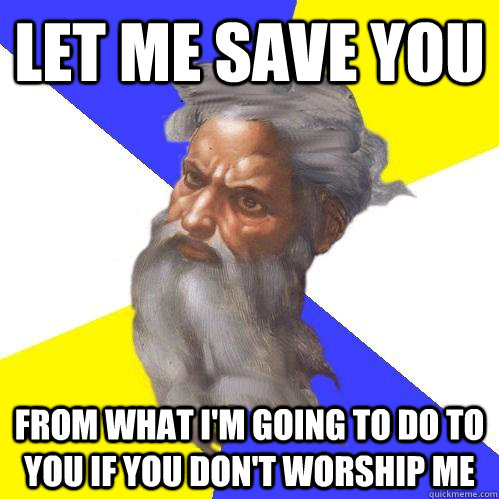I suppose god is a logical impossibility, so one may be able to prove his non-existence by asserting he is an inherent contradiction, and inherent contradictions do not exist in the real world.
1. God is omnipotent.
2. God cannot create a stone that he cannot lift.
3. From (2), God is not omnipotent.
4. (1) and (3) contradict.
5. From (4), God is a contradiction and therefore cannot exist.
Solarfingers made a good point concerning this argument, and there are even more things to consider about it. There’s a misunderstanding here of what "omnipotence” means, and it needs to be qualified. Omnipotence entails the unlimited potential for logical action; it neither implies nor entails the ability to do the logically impossible. Given that fact, premises 3 & 4 of that argument are void, and the conclusion would no longer follow. In this regard, an omnipotent God remains a logical possibility.
Consider this Elus: even if omnipotence
did imply the ability to do the logically impossible, the argument still wouldn’t hold. If an omnipotent God could do the logically impossible, then premise 2 would also be void. Though it is logically impossible for an omnipotent being to create a stone too heavy to lift, an “omnipotent” God under this revised understanding could still create such a stone.
I may have been sloppy in my wording.......what I mean is that you can't prove that there is no god anywhere, because you can't look everywhere and you probably don't/can't know all the possible definitions of gods that people might invent
That’s alright, I have my days too. The rest of this part is perfectly legitimate.
but when somebody comes up with a specific god in a specific place it has historically always been possible to demolish them. Some people (believers) will obviously disagree.
This, however, is false. I’m assuming by demolish you mean “prove to be
certainly false.” It is true that many specific conceptions have been invalidated by their inherent contradictions, yet it not true that
all have been, e.g., the monotheistic conception of an omnipotent and morally perfect God. To date, there is no inherent contradiction that has been shown to refute this conception, though the
Problem of Evil looked like a good contender for a few centuries. However, as I noted previously, the logical version of this alleged contradiction has long been refuted within academia. It is due to this fact that belief in God still remains a tenable option for the rational mind, and why many highly intelligent and elite academics continue to do so, regardless of how secular media stereotypes religious believers.
Though the logic behind the
alleged
Problem of Evil has been refuted, the emotional problem remains for many, and that is the crux of the issue; though no tenable argument can be held against the existence of God, the majority of intellectual atheists (from my experience) use intellectualism as a guise for their emotional problem with such a being, whether or not they would consciously admit it. Most of these individuals simply don’t
want there to be a God, regardless of whether or not such a being exists. They want to be the sovereigns over their own lives, and be neither contingent nor accountable to some higher being. This is essentially the faith of atheism, and Thomas Nagel, atheist philosopher of mind at New York University, illustrates this point well:
“I want atheism to be true and am made uneasy by the fact that some of the most intelligent and well-informed people I know are religious believers. It isn’t just that I don’t believe in God and, naturally, hope that I’m right in my belief. It’s that I
hope there is no God! I don’t
want there to be a God; I don’t want the universe to be like that” (bold highlighting added for emphasis).
Edited by NeuroGuy, 24 June 2013 - 10:57 PM.


















































